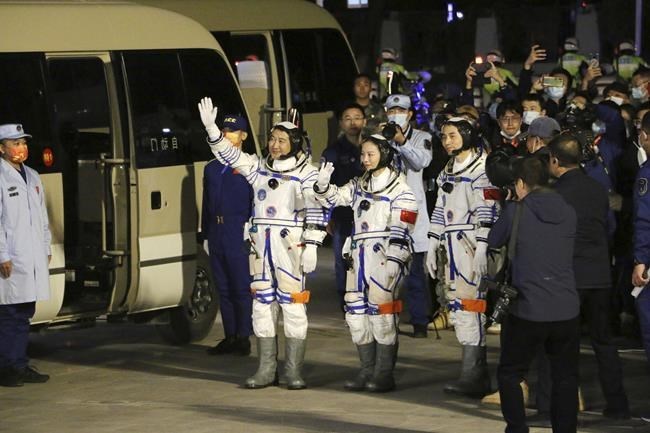BEIJING (AP) — China on Saturday launched a three-person crew for a six-month mission aboard its space station that is planned at setting a new record for the length of time spent in space by Chinese astronauts as the country moves toward completing the orbiting structure.
The Shenzhou-13 spaceship carrying the three astronauts was launched by a Long March-2F rocket at 12:25 a.m. Saturday (4225 GMT Friday).
It is expected to complete docking with the Tianhe module within the next six hours, beginning the mission that will continue the work of the first three-person crew that spent 90 days aboard. Those crew members conducted two spacewalks and deployed a 10-meter (33-foot) mechanical arm before returning to Earth in mid-September.
The new crew includes two veterans of space travel. Pilot Zhai Zhigang, 55, and Wang Yaping, 41, the only woman on the mission, and Ye Guangfu, 41, who is making his first trip to space.
The crew was seen off by a military band and supporters singing “Ode to the Motherland,” underscoring the weight of national pride invested in the China’s space program that has advanced rapidly in recent years.
The crew’s scheduled activities include up to three spacewalks to install equipment in preparation for expanding the station, assessing living conditions in the module and conducting experiments in space medicine and other fields.
China’s military-run space program plans to send multiple crews to the station over the next two years to make it fully functional. Shenzhou-13 is the fifth mission to the structure, including trips without crews to deliver supplies.
When completed with the addition of two more modules — named Mengtian and Wentian — the station will weigh about 66 tons, a fraction of the size of the International Space Station, which launched its first module in 1998 and will weigh around 450 tons when completed.
The two additional Chinese modules are due to be launched before the end of next year during the stay of the yet-to-be-named Shenzhou-14 crew.
China's Foreign Ministry on Friday renewed its commitment to cooperation with other nations in the peaceful use of space.
Spokesperson Zhao Lijian said sending humans into space was a “common cause of mankind,” and China would “continue to extend the depth and breadth of international cooperation and exchanges” in crewed spaceflight and “make positive contributions to the exploration of the mysteries of the universe.”
China was excluded from the International Space Station largely due to U.S. objections over the Chinese program’s secretive nature and close military ties, prompting it to launch two experimental modules before starting on the permanent station.
U.S. law requires congressional approval for contact between the American and Chinese space programs, but China is cooperating with space experts from countries including France, Sweden, Russia and Italy. Chinese officials have said they look forward to hosting astronauts from other countries aboard the space station once it becomes fully functional.
China has launched seven crewed missions with a total of 14 astronauts aboard since 2003, when it became only the third country after the former Soviet Union and the United States to put a person in space on its own. Two Chinese astronauts have flown twice.
Along with its crewed missions, China has expanded its work on lunar and Mars exploration, including placing a rover on the little-explored far side of the Moon and returning lunar rocks to Earth for the first time since the 1970s.
China this year also landed its Tianwen-1 space probe on Mars, whose accompanying Zhurong rover has been exploring for evidence of life on the red planet.
Other Chinese space programs call for collecting soil from an asteroid and bring back additional lunar samples. China has also expressed an aspiration to land people on the moon and possibly build a scientific base there, although no timeline has been proposed for such projects. A highly secretive space plane is also reportedly under development.
The Associated Press

